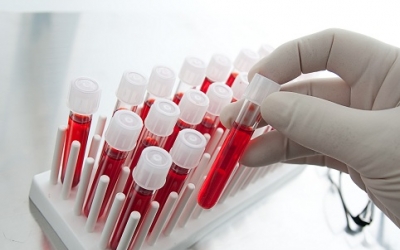- Latest news▼
-
18:00, April 18 Daily Mail: Elderly woman in China gets infected with brain-eating amoeba

-
14:19, April 18 Obesity: exercising before breakfast helps you lose weight faster

-
10:42, April 18 The Conversation: childhood trauma can cause pathological hoarding

-
08:37, April 18 Daily Mail: Satiating food reduces cravings for sweets, nutritionist says

-
18:22, April 17 First Armenian-German Conference entitled “Heart Failure Spring School”

-
08:38, April 17 Why do kids usually recover from COVID-19 more easily than adults?

-
14:37, April 16 Daily Mail: intermittent fasting is not suitable for children and women before their periods

-
16:41, April 15 Cell: in carriers of defective BRCA2 gene, sugar consumption increases cancer risk

-
15:04, April 15 305 cases of measles recorded in Armenia so far in 2024

-
14:38, April 15 Food and Environmental Virology: tea contributes to effective coronavirus control

-
12:41, April 15 Daily Mail: vitamin A, B3 and E supplements can be dangerous

-
10:56, April 15 Diabetes Care: evening physical activity is good for the heart

-
08:27, April 15 Women are more susceptible to blood loss and death during bypass surgery than men, researchers say

-
18:42, April 13 WHO: Nigeria pioneers revolutionary meningitis vaccine

-
16:43, April 13 One-third of women experience menstruation-related migraines, most often during premenopause - study

All materials
Simple blood test could predict breast cancer relapse risk

Weeks or even months before there is evidence of a tumor in scans or biopsies, a simple blood test could detect the risk of relapse in survivors of early stage breast cancer.
The "liquid biopsy" developed at the Institute of Cancer Research in London is a kind of blood test that shows promise in detecting cancer DNA in the blood before the cells grow into tumors. The results of a prospective pilot study of the test were published Wednesday in the journal Science Translational Medicine.
Using a technique called mutation tracking, researchers say the blood test identified the risk for relapse an average of 7.9 months before traditional biopsies or imaging scans would have shown tumors, referred to as clinical relapse.
"By tracking that, we can see whether after surgery there is disease present in that patient that we couldn't actually detect with our normal imaging approaches," Professor Mitch Dowsett of the Institute of Cancer Research and The Royal Marsden NHS Foundation Trust told CBS News. "It's far more sensitive and it's actually very specific."
Researchers say the blood test they developed can detect an individual's specific "circulating tumor DNA," or ctDNA, matched to the cancer for which they were treated. Previous research has also indicated that mapping cancer DNA could be one of the keys to earlier disease detection.
In this study, the team followed a 55 English women who were diagnosed with early stage breast cancer, then treated with both surgery and chemotherapy. They monitored ctDNA in the women's blood tests after surgery and every six months using the DNA profiles of each individual's specific pre-treatment cancer cells. In 54 of the 55 women, researchers were able to accurately predict relapse risk based on ctDNA levels.
Breast cancer is the most commonly diagnosed cancer among women, aside from skin cancers, and the second most deadly cancer in women. The study says 95 percent of women diagnosed have early stage breast cancer that doesn't appear to have spread. After treatment, there can be undetected, residual cancer cells.
"This new technique will allow us to begin to measure whether or not that disease is coming through before it actually reveals itself," Dowsett said.
Building on these results, the team plans a larger study next year. It could be a few years before the blood tests are widely available to cancer survivors.
Follow NEWS.am Medicine on Facebook and Twitter
- Video
- Event calendar
- Archive
- Most read
month
week
day
- Pediatrics: Hypoglossal nerve stimulation implant helps with sleep apnea 1360
- Health minister: Simulation educational center will be created, assisted reproductive technology capacity will increase in Armenia 1316
- WHO: Nigeria pioneers revolutionary meningitis vaccine 1167
- One-third of women experience menstruation-related migraines, most often during premenopause - study 1135
- Women are more susceptible to blood loss and death during bypass surgery than men, researchers say 942
- Daily Mail: vitamin A, B3 and E supplements can be dangerous 919
- Food and Environmental Virology: tea contributes to effective coronavirus control 919
- Cell: in carriers of defective BRCA2 gene, sugar consumption increases cancer risk 890
- 305 cases of measles recorded in Armenia so far in 2024 883
- Diabetes Care: evening physical activity is good for the heart 873
- Daily Mail: intermittent fasting is not suitable for children and women before their periods 697
- First Armenian-German Conference entitled “Heart Failure Spring School” 491
- Why do kids usually recover from COVID-19 more easily than adults? 358
- Obesity: exercising before breakfast helps you lose weight faster 341
- The Conversation: childhood trauma can cause pathological hoarding 337
- Find us on Facebook
- Poll





